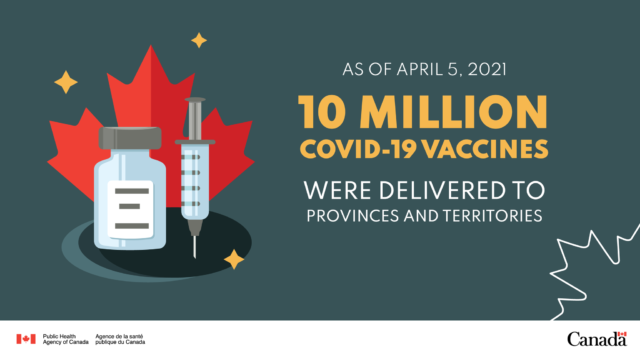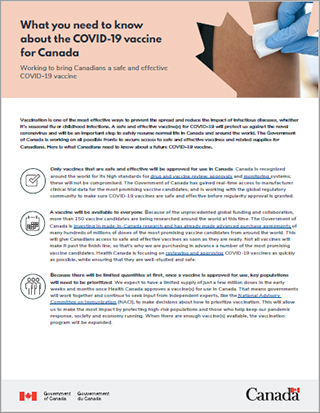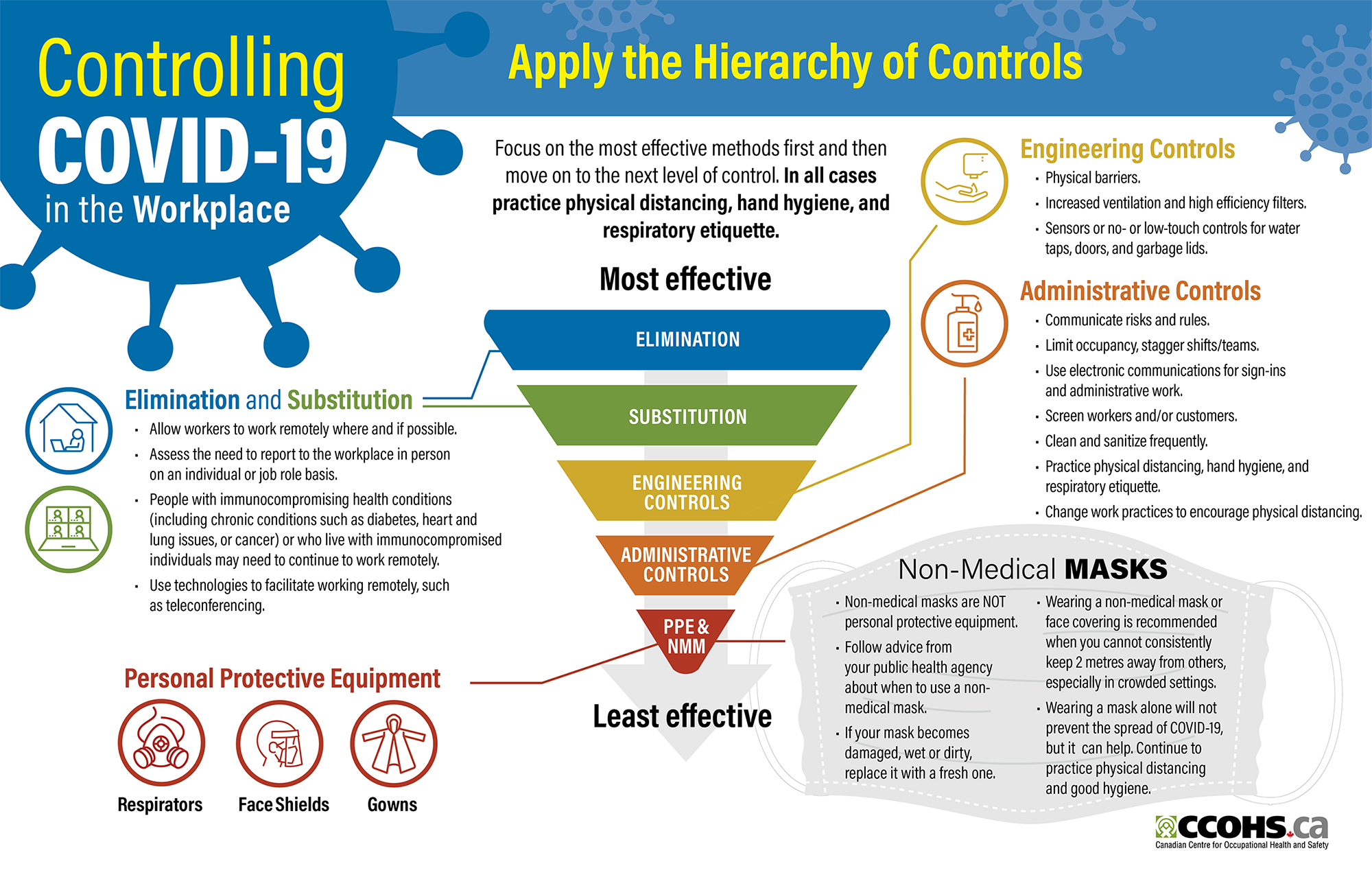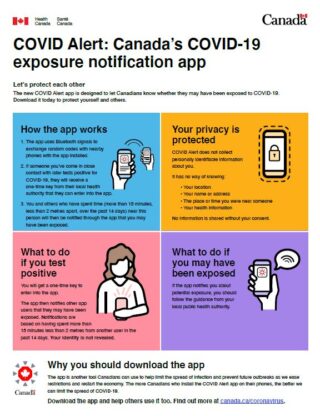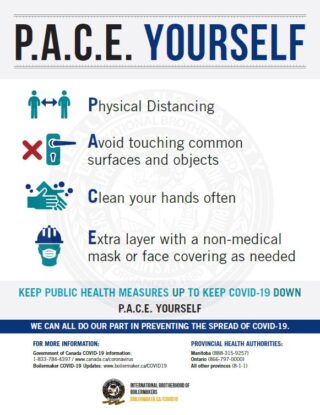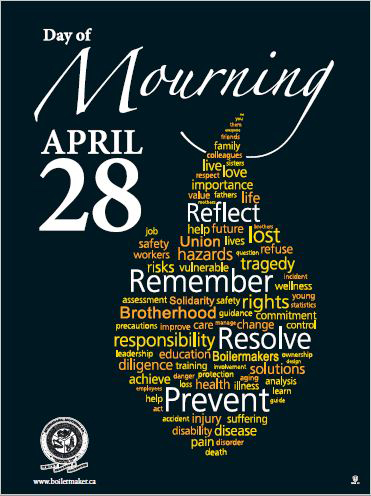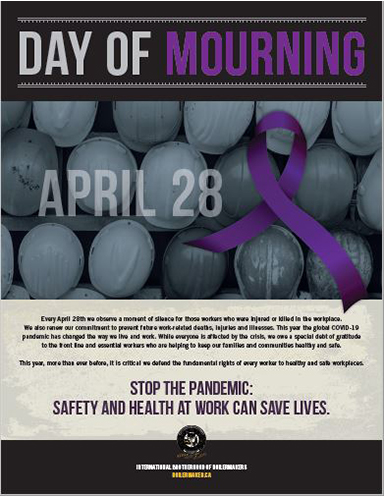May 3, 2022
Producing made-in-Canada vaccines
COVID-19 vaccine developer Moderna will build a state-of-the-art manufacturing facility in Quebec to deliver made-in-Canada vaccines. When completed, this new facility will be able to produce up to 100 million mRNA vaccine doses annually. Construction is set to start in 2022 and the facility is expected to be operational in 2024 at the earliest, subject to planning and regulatory approvals. To learn more: https://pm.gc.ca/en/news/news-releases/2022/04/29/producing-made-canada-vaccines-and-creating-hundreds-good-jobs
March 31, 2022
National Vaccination Coverage
Vaccination coverage is high in Canada, with 84.70% of the population vaccinated with at least one dose. To learn more and to stay up-to-date, visit: COVID-19 vaccination in Canada - Government of Canada website
March 10, 2022
COVIDTrends
COVIDTrends is a tool that provides summary data about COVID‑19 in your area. When you search by municipality (city, town), or by the first 3 characters of your postal code, data from your health region will appear. Learn more here: COVIDTrends Government of Canada website
January 18, 2022
Training Extensions due to COVID-19
Please be aware that all Industrial Education Cooperative (Sarnia) records for the following courses that expire between January 19, 2022, and June 1, 2022, will receive a four (4) month extension:
- Basic Safety Orientation
- Confined Space Entry
- Safety Attendant
- Respiratory Fit Tests
January 11, 2022
Canada's COVID-19 Economic Response Plan
If you are negatively impacted due to COVID-19 illness or layoffs, there are several federal government supports you may be able to access.
To learn more, visit: Government of Canada website
Covid-19: Going out Safely
Public health advice across Canada may be different depending on where you live. This tool will help you:
- assess the risks before going out
- make informed decisions while considering local public health restrictions
Keep COVID-19 out of Your Holiday Season
This holiday season many people are planning to visit friends and family or attend public events for the first time since the pandemic began. However, COVID-19 continues to spread, and it only takes a single infected person to start an outbreak.
Here are some tips on making safe choices during the holiday season:
- Avoid large indoor gatherings with people from outside your household.
- Shop online or during off-peak hours to avoid crowds.
- Follow personal preventive practices when out in public (e.g., physical distancing, mask wearing, hand hygiene, minimizing interactions).
- Host safe events and gatherings (e.g., smaller groups, household members only, outdoor or virtual settings).
- Follow the most current federal, provincial, and territorial travel and public health requirements (e.g., testing, isolation, mask wearing, etc).
Don’t let your guard down! Maintaining a COVID-19 free holiday depends on everyone doing their part.
Resources
- Coronavirus disease (COVID-19), Public Health Agency of Canada
November 10, 2021
COVID-19 Update: We must maintain civility
Letter from IVP Arnie Stadnick to all members:
Government of Canada announces adjustments to Canada’s border measures
Starting November 30, vaccination will be required for travel within and out of Canada. A valid COVID-19 molecular test will no longer be accepted as an alternative to vaccination unless travellers are eligible for one of the limited exemptions, such as a medical inability to be vaccinated. Read more here:
COVID-19: Question of the Week Series
To ensure our members continue to have access to the best information on Covid-19, the IBB has partnered with Cynthia Carr (founder and epidemiologist with EPI Research Inc) to assist members with COVID-19 questions and concerns by providing resources and summaries to common themes as identified by you.
Submit your question!
A confidential question form can be accessed either through the following link: https://www.surveymonkey.com/r/boilermakersQoW
or by hovering your smartphone camera over this QR code:
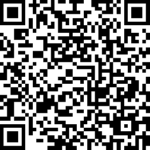
See below for further information:
COVID-19 Update: We must maintain civility
Letter from IVP Arnie Stadnick to all members:
Flu Season
It’s Flu Season, and we continue to see Covid-19 in our communities. By getting your flu shot, the Covid-19 vaccine, and following individual public health measures, you can help do your part to keep yourself and your community safe and healthy. To learn more:
Government of Canada Flu (influenza): Prevention and risks
Protect Yourself. Get Vaccinated.
19 to Zero is a dedicated coalition of academics, public health experts, behavioural economists, and creative professionals working to understand, engage with, and ultimately shift public perceptions around COVID-19 behaviours and vaccination. Watch their most recent media campaign here:
Alberta Oilsands Outbreaks during the 3rd and 4th COVID-19 waves
Measures for protecting each other from COVID-19 in the workplace depend on exposure risk. That risk varies based on the type of work being performed, the potential for interaction (prolonged or otherwise) with people, and contamination of the work environment. Employers have a clear obligation to implement communicable disease prevention programs based on a thorough workplace hazard assessment, using appropriate combinations of engineering and administrative controls, safe work practices, and personal protective equipment (PPE) to prevent worker exposures.
According to Alberta Health, a total of 5,432 workers in Alberta oilsands were infected by the COVID-19 coronavirus in 20 workplace outbreaks during the third and fourth waves of the pandemic.
Read more here: Canadian Occupational Safety article
World Suicide Prevention Day -September 10th
Any significant change in behaviour can be a warning sign for suicide, and the more attention we give to those around us, the more alert we can be to these changes in behaviour.

Suicide Prevention - How to help: https://www.suicideinfo.ca/how-to-help/
In the face of new, fast-spreading Delta variant of COVID-19, Boilermakers urging vaccination for all members
Boilermakers, and other workers across Canada, have persevered through the unprecedented COVID-19 health crisis for a full year and a half, and as vaccinations have ramped up we can see the light at the end of the tunnel, but we are not yet entirely in the clear as the Delta variant of the virus threatens another dangerous wave of illness.
With the surge of the Delta variant across Canada, rising case counts and increasing negative impacts on the health care system, the IBB is recommending vaccination for any member who has not yet received the vaccine, if he or she is able to do so. While the union respects each and every member’s right to choose for themselves, we strongly urge vaccination, especially in the face of the Delta variant, as a way to keep all members and our community safe from the coronavirus disease.
“The facts are clear,” said the Boilermakers’ National Health & Safety Director, Jason McInnis. “The shortest path to defeating this virus once and for all is widespread vaccination. Vaccines save lives, and the data proves it. We don’t want any members, or their familes or friends, to contract this particularly nasty, and potentially lethal, illness. Our union is squarely in the pro-vaccine camp.”
IVP Arnie Stadnick added, “Members are still free to choose for themselves, but we hope that every member will choose vaccination. For those who do opt out of getting this preventative measure, they should be aware of the risk they are taking, and that there may be new protocols in the form of updated workplace rules set by employers, as is happening in workplaces across Canada.”
Members who have not yet received their vaccination, but would like to do so, should contact their health care professional, a nearby pharmacy, or check the IBB’s online vaccine page at: boilermaker.ca/en/vaccines/
Health Canada: Ivermectin not authorized to prevent or treat COVID-19; may cause serious health problems
Health Canada has received concerning reports of the use of veterinary ivermectin to prevent or treat COVID-19. Canadians should never consume health products intended for animals because of the potential serious health dangers posed by them.
Read more here:
https://healthycanadians.gc.ca/recall-alert-rappel-avis/hc-sc/2021/76365a-eng.php
COVID-19 Vaccines: What You Really Need to Know
Whether you’re wondering if the vaccine can make you sick, how it works, or what you can do after you get fully vaccinated, the following article is provided to give you the answers you’re looking for:
https://menshealthfoundation.ca/mental-health/covid-19-vaccines-what-you-really-need-to-know/
Vaccine Safety in Canada
Ever wonder how Health Canada ensures that vaccines are safe and effective? Check out this video and pdf to learn more.
Almost all plan to get a second shot, but a quarter doubt necessity
The latest Abacus Data research conducted as a contribution to the Faster Together coalition reveals that the number of vaccine hesitant Canadians has continued to decline, and now numbers 13%, with another 6% indicating they will never take a Covid19 vaccine.
Among those who have already had a first shot of vaccine, 98% say they have either had their second shot already or intend to take it as soon as possible. Just 2% say they might not bother with the second shot.
While these numbers suggest Canada can expect continued forward momentum in vaccine acceptance, we need to continue to provide education and encouragement about the second shot and its role in health protection from COVID-19 so members can make an informed choice for themselves.
For more information: https://boilermaker.ca/en/vaccines/
Source: https://abacusdata.ca/second-shot-canada-vaccine/
COVID-19 Reopening Guide
As COVID-19 vaccines continue rolling out across Canada, provinces are making tentative plans for reopening.
Criteria for moving to Phase 1
- British Columbia: At least 60% of the 18+ population vaccinated with one dose, along with stable case counts and COVID-19 hospitalizations.
- Alberta: Two weeks after 50% of Albertans 12+ vaccinated with one dose and hospitalizations are below 800 and declining.
- Saskatchewan: The stages will be implemented via public health orders, and the timing will be dictated by evidence of transmission.
- Manitoba: No current reopening plan.
- Ontario: 60% of adults vaccinated with one dose, plus improvements in key public health and health care indicators, including rates of COVID-19 positivity and hospitalization.
- Quebec: Phased-in relaxation of restrictions is beginning now; changes pegged for June 25 would require 75% of people 12+ vaccinated with first dose.
- Nova Scotia: Currently in Phase 1 beginning June 2nd. Target: 50% of population one dose coverage.
- Prince Edward Island: The province is open to a great extent already with many capacity restrictions. The province will begin a five-step plan on June 6 to fully reopen. Some public health and travel measures will remain in place until 80% of eligible Island residents are fully immunized, herd protection is achieved and the threat posed by the virus decreases.
- New Brunswick: The province will move to its fully open Green Phase once herd immunity is achieved with 75% of the eligible population 12 years and older fully vaccinated; currently targeting Aug. 2nd.
- Newfoundland and Labrador: Most of province is open under Alert Level 2, with the exception of the Northeast Coast and Central Region, which is at Level 4.
To read more: https://www.cbc.ca/news/canada/covid-reopen-plans-1.6043036
COVID-19: Life after vaccination
From Health Canada: More people getting vaccinated means fewer people getting sick. When you get your shot, you make it safer in your community so that certain measures can be lifted and we can gather safely.
Going Out? Do It Safely.
With persistently high rates of infection in many areas of the country, we must remain vigilant with public health and individual measures to reduce spread, prevent more severe illness & protect health care capacity.
Vaccines for COVID-19: How to get vaccinated or register
Provinces and territories are responsible for the vaccination rollout plans for their residents, including:
- the order in which groups will be vaccinated
- when vaccinations will be available
- where vaccinations will be administered
- whether or not you need to register
Check how, when and where you can get vaccinated
Coronavirus variants: What you need to know
What do scientists mean when they talk about variants and what might this mean for the future of the pandemic?
COVID-19 Vaccines
From the start of the COVID-19 pandemic, an enormous amount of information has been communicated about the virus and how to keep ourselves and our workplaces safe. COVID-19 vaccines can stop the spread by helping you not get sick. CCOHS has some answers to commonly asked questions about COVID-19 vaccines here: https://www.ccohs.ca/covid19/vaccines-faq/index.html
10 million COVID-19 vaccines delivered
On April 5th, the Government of Canada marked the delivery of more than 10 million COVID-19 vaccines to provinces and territories. Learn more about how the Government of Canada is distributing and allocating vaccines.
Why you can't compare Covid-19 vaccines
COVID-19 vaccines will be available to everyone in Canada who are recommended to get the vaccine by federal, provincial and territorial public health bodies. Doses of the vaccines are being distributed in Canada in phases, which began in December 2020.
It is common to see different vaccines reported in the news with different ‘efficacy rates’. But what does a vaccine’s “efficacy rate” actually mean?
Communication from IVP Stadnick – COVID Day of Observance
Equipping ourselves against mis- and disinformation during COVID-19
From the Public Health Agency of Canada (PHAC):
The COVID-19 pandemic has clearly demonstrated that accurate and timely information is key to saving lives. Throughout the pandemic we have relied on technology and information-sharing platforms to keep us safe, informed, and connected. At the same time, these platforms have contributed to an overabundance of information - an infodemic - that worsens the current pandemic by allowing false information to circulate more easily, hampering public health responses, creating confusion and distrust, and ultimately, making it more difficult for people to make vital decisions about their health and safety.
Try checking to see if the information can be validated by other legitimate sources, like the Government of Canada's or the World Health Organization's COVID-19 websites, from provincial and territorial health ministry sites, or from local public health units or other trusted institutions like universities or health organizations.
To read the full article from PHAC, click here.
PHAC recommends tools like SPOTFakeNews.ca which helps Canadians learn how to SPOT fake news by asking yourself 4 critical questions:
S: Is this a credible SOURCE?
P: Is the PERSPECTIVE biased?
O: Are OTHER sources reporting the same story?
T: Is the story TIMELY?
Federal Support For Workers During COVID-19
From CBTU: If you lose your job either due to short-term COVID-19 illness or layoffs there are a few federal government supports you can access. The Canadian Government has expanded the Employment Insurance (EI) program, but those who are not eligible for EI may apply for one of the newly implemented Recovery Benefits.
Learn more:
- https://www.canada.ca/en/services/benefits/covid19-emergency-benefits.html (Government of Canada)
- Federal Support For Workers During COVID-19 (PDF)
Bio Life Hand Sanitizer Recall
Do you have Bio Life hand sanitizer? Stop using it. Testing confirmed it contains methanol, which may cause serious health issues, and not enough ethanol to be effective.
Learn more: https://healthycanadians.gc.ca/recall-alert-rappel-avis/hc-sc/2020/74137a-eng.php (Government of Canada)
Infectious Disease Outbreaks and Pandemics
With globalization, the threats of new infectious diseases are a growing concern, and when a new kind of virus spreads easily from person to person throughout the world, it can become a pandemic. Being informed and knowing what to do in the event of an outbreak will help minimize the impacts on our daily lives, work, and activities.
To learn more visit CCOHS at https://www.ccohs.ca/outbreaks/
How do vaccines work?
Learn the science behind how vaccines trigger an immune response and teach our bodies to recognize dangerous pathogens.
COVID-19 Vaccines
COVID-19 vaccines will be available to everyone in Canada who are recommended to get the vaccine by federal, provincial, or territorial public health agencies. The vaccine rollout will be done in phases. To find up to date information on the distribution of COVID-19 vaccines - including latest quantities and locations – please visit: Distributing Vaccines (Government of Canada).
Learn more about the COVID-19 vaccine by clicking the image below (PDF).
COVID-19 Scams
Between March 6th and Nov. 30th, there have been 6,526 recorded victims of COVID-19 fraud in Canada losing collectively $6.8 million. Don’t be one of them. Be on the lookout for COVID-19 scams. For more information: https://www.canada.ca/en/public-safety-canada/campaigns/covid19.html
What you need to know about the COVID-19 vaccine for Canada
Vaccination is one of the most effective ways to prevent the spread and reduce the impact of infectious diseases, whether it's seasonal flu or childhood infections. Learn more by clicking the image below (PDF).
COVID-19: Plan a safe holiday or celebration
The Public Health Agency of Canada offers the following safety advice to reduce your risk and help prevent the spread of COVID-19 during holidays and celebrations: https://www.canada.ca/en/public-health/services/diseases/2019-novel-coronavirus-infection/guidance-documents/plan-safe-holiday-celebration.html
Canada's top public health doctor now recommends 3-layer non-medical masks
To protect yourself and others, wear a non-medical mask or face covering when:
- you're in public and you might come into close contact with others
- you're in shared indoor spaces with people from outside your immediate household
- advised by your local public health authority
A mask or face covering can be homemade or purchased, and should:
- be made of at least 3 layers
- 2 layers should be tightly woven material fabric, such as cotton or linen
- the third (middle) layer should be a filter-type fabric, such as non-woven polypropylene fabric
- be large enough to completely and comfortably cover the nose, mouth and chin without gaping
- allow for easy breathing
- fit securely to the head with ties or ear loops
- be comfortable and not require frequent adjustments
- be changed as soon as possible if damp or dirty
- maintain its shape after washing and drying
For more information: Non-medical masks and face coverings (Government of Canada)
Canada Recovery Sickness Benefit (CRSB)
The Canada Recovery Sickness Benefit (CRSB) gives income support to employed and self-employed individuals who are unable to work because they are sick or need to self-isolate due to COVID-19, or have an underlying health condition that puts them at greater risk of getting COVID-19. The CRSB is administered by the Canada Revenue Agency (CRA).
If you are eligible for the CRSB, you can receive $500 ($450 after taxes withheld) for a 1-week period. If your situation continues past 1 week, you will need to apply again. You may apply up to a total of 2 weeks between September 27, 2020 and September 25, 2021.
Canada Recovery Sickness Benefit (CRSB)
COVID-19 benefits and services
COVIDTrends
COVIDTrends is a tool that provides summary data about COVID-19 in your area (by health regions). When you search by municipality (city, town), or by the first 3 characters of your postal code, data from your health region will appear. To learn more, visit:
https://health-infobase.canada.ca/covid-19/covidtrends/
Controlling COVID-19 in the Workplace
Selecting an appropriate method to control a hazard in the workplace is not always easy. When it comes to the transmission of viruses such as COVID-19, workplaces should consider establishing control measures that have the greatest impact. The main ways to control a hazard, from the most to the least effective, include elimination (and substitution), engineering controls, administrative controls, and personal protective equipment (PPE). In all cases, always practice physical distancing, hand hygiene, and respiratory etiquette.
To learn more, click on the image below to view a poster (PDF) from the Canadian Centre for Occupational Health and Safety (CCOHS):
COVID Alert: Canada’s COVID-19 exposure notification app
The new COVID Alert app is designed to let Canadians know whether they may have been exposed to COVID-19. Currently live in Ontario and Newfoundland with the goal of a national roll out. How the COVID Alert app works:
Download the COVID Alert App today to protect yourself and others:
https://www.canada.ca/en/public-health/services/diseases/coronavirus-disease-covid-19/covid-alert.html
International Overdose Awareness Day
August 31st is International Overdose Awareness Day. During COVID-19, many areas are reporting opioid-related overdoses, affecting our families, friends and neighbours. Learn the signs and symptoms here:
Opioid Overdoses: What To Do (PDF)
COVID-19 Situational Awareness Dashboard
Want to learn more about how the COVID-19 outbreak is evolving in Canada? Use the updated interactive Public Health Agency of Canada's Situational Awareness Dashboard to find information at the national, provincial/territorial and regional health levels.
Flu (influenza): Get your flu shot
On an average year, Health Canada recommends everyone 6 months and older should get the annual flu shot. The flu shot is your best defence against the seasonal flu. It can save lives by:
- protecting you, if you are exposed to the virus
- preventing you from getting very sick
- protecting people close to you - because you are less likely to spread the virus
But 2020 is not an average year. Experts, such as the Canadian Medical Association, are concerned with a 'Twindemic' where a new surge of Covid-19 (that has no vaccine) and the typical flu season could overlap and overwhelm the health care system. In addition, the overlapping symptoms between Covid-19 and the flu will make it difficult for you, your employer or your healthcare provider to distinguish between the two without access to Covid-19 specific testing.
To learn more and find out where to get your flu vaccine, visit www.canada.ca/flu
COVID Alert App
COVID Alert, the national COVID-19 exposure notification app, is now available for download in Canada and currently being testing in Ontario. Federal and Ontario privacy commissioners have concluded their review of the COVID Alert app and support its use. Designed to help limit the spread of the virus and preventing future outbreaks. It provides notifications about potential exposure to the virus that causes COVID-19 so you can take action.
Find out more: https://www.canada.ca/en/public-health/services/diseases/coronavirus-disease-covid-19/covid-alert.html
Protect yourself against fraud
Did someone ask you to repay CERB or CEWS? Beware of fraudulent emails, texts or calls claiming to be from the Canada Revenue Agency. Here's how to tell the difference between a scam and legitimate communications:
https://www.canada.ca/en/revenue-agency/corporate/security/protect-yourself-against-fraud.html
How close are we to a vaccine for COVID-19?
The CBC has developed a website tracking the different vaccines under development, and where they are in the pipeline. For more information: https://newsinteractives.cbc.ca/coronavirusvaccinetracker/
COVID-19 Precautions
Human coronaviruses cause infections of the nose, throat and lungs. They are most commonly spread from an infected person through:
- respiratory droplets generated when you cough or sneeze
- close, prolonged personal contact, such as touching or shaking hands
- touching something with the virus on it, then touching your mouth, nose or eyes before washing your hands
Current evidence suggests person-to-person spread is efficient when there is close contact.
During the Coronavirus (COVID-19) pandemic, it is essential to ensure everyone is protected to minimize the risk of the infection spreading. To learn more: check out the resources tab or this updated toolbox talk (PDF).
Get the Facts on Masks
At this point during the COVID-19 pandemic, many workplaces in Canada are starting to reopen. Some businesses, especially retail and food stores, have implemented safety rules and precautions that ask customers and staff to wear masks. When worn properly, a non-medical mask or face covering can reduce the spread of the virus.
Read more: Get the Facts on Masks (CCOHS)
Hard-surface disinfectants and hand sanitizers
How to find out which products are on Health Canada's list of hard-surface disinfectants with evidence against COVID-19:
1. Locate the Drug Identification Number (DIN) on the disinfectant product label
2. Look for that number on the Disinfectants for Use Against SARS-CoV-2 (COVID-19) list
How to find out which antiseptic skin cleansers or hand sanitizers meet Health Canada's requirements for sale in Canada:
1. Locate the Natural Product Number (NPN) or Drug Identification Number (DIN) on the product label
2. Look for that number on the hand sanitizers list
Personal practices, such as proper hygiene help reduce the risk of infection or spreading infection to others:
- wash your hands often with soap and water for at least 20 seconds, especially after using the washroom and when preparing food
- use alcohol-based hand sanitizers if soap and water are not available
- keep hand sanitizers out of reach of children and always supervise them when using hand sanitizers, as ingesting even small amounts of sanitizer can be fatal
Safer Cleaning, Sanitizing and Disinfecting Strategies to Reduce and Prevent COVID-19 Transmission
Proper cleaning and disinfecting are important for reducing the spread of COVID-19. This fact sheet provides best practices for cleaning, sanitizing and disinfecting surfaces.
Safer Cleaning, Sanitizing and Disinfecting Strategies (PDF)
P.A.C.E. Yourself
Keep public health measures up to keep COVID-19 down. Pace yourself with:
Physical Distancing
Avoid touching common surfaces and objects
Clean your hands often
Extra layer with non-medical masks or face covering as needed
Click the image below to open poster (PDF):
Federal Transport Minister expands required use of face masks on planes, trains, ships and transit effective June 4th
Federal Transport Minister Marc Garneau is expanding the required use of face coverings on planes, trains, ships and transit to reduce the spread of COVID-19.
Effective at noon on Thursday, airline flight crew and airport workers will be required to wear non-medical masks, in addition to the existing requirement for passengers. Read more here: https://www.ohscanada.com/garneau-expands-required-use-face-masks-planes-trains-ships-transit/
Benefit-Finder Tool for Emergency Aid
The Federal government has launched an online tool to help Canadians navigate the various financial benefits available during the pandemic.
Learn more here: https://covid-benefits.alpha.canada.ca/en/start
Financial help for Canadians affected by COVID-19
The CBC has put together a guide to the benefits that the federal government, provinces and territories are offering to people financially affected by the coronavirus. To view, click here: https://newsinteractives.cbc.ca/coronavirusbenefits/
Wellness Together Canada
Due to COVID-19, many people are concerned about their physical and mental wellbeing. Canadians are being challenged in a number of ways because of isolation, financial and employment uncertainty and disruptions to daily life. Wellness Together Canada provides free tools and resources to help get Canadians back on track. These include modules for addressing low mood, worry, substance use, social isolation and relationship issues.
To learn more: https://ca.portal.gs
April 28th, National Day of Mourning
Please read the letter below from International Vice-President Arnie Stadnick for the National Day of Mourning.
April 28th, National Day of Mourning (PDF)
Day of Mourning Posters
The following posters are provided in PDF format, click on the images to view.
Health Canada warns against 'fraudulent and unauthorized' N95 masks
Health Canada is warning Canadians about the risks of using fraudulent and unauthorized N95 masks that may not offer protection against COVID-19.
Read more: Fraudulent and unauthorized N95 respirators may not protect consumers against COVID-19
Mental Health Continuum Video
Mental Health we all have it. See how it can affect you both positively and negatively. Watch this 3-minute video and see what you can do to make yourself the best you can be. Please share it with your fellow brothers and sisters. In times like these, we need to think of our most vulnerable members. Keeping in contact goes a long way to prevent isolation.
Using masks to prevent coronavirus
In an attempt to slow the transmission of COVID-19, federal, provincial, and territorial governments in Canada have urged Canadians to limit their interactions with others, practice good personal hygiene and follow physical distancing measures, as well as to stay and work from home to the extent possible. Both the Public Health Agency of Canada (PHAC) and the US CDC now recommend the voluntary use of non-medical masks or cloth face coverings for the general public where physical distancing (6 ft) is difficult to maintain. This is a departure from the original guidance on masks for the general public based on evolving research to minimize the transmission of COVID-19.
How to make your own face covering
CDC: How to make and wear a face cover (PDF)
In the following video US Surgeon General, Dr. Jerome Adams, shares ways to create your own face covering in a few easy steps.
Preventing coronavirus
The following is advice from the Government of Canada on all the ways you can prevent the spread of coronavirus, including advice on wearing masks.
Government of Canada: Preventing coronavirus
Canada Emergency Response Benefit (CERB)
If you have stopped working because of COVID-19, the Canada Emergency Response Benefit (CERB) may provide you with temporary income support. The CERB provides $500 a week for up to 16 weeks. If you or someone you know need to apply for this benefit, please see below.For the most up to date information including who is eligible and how to apply, please refer to the Government of Canada website.
Before you apply
- Determine your eligibility – see Who can apply below.
- Check your myCRA account login information - If you are applying online, double check your myCRA account username and password by signing in on the CRA Website.
- Setup Direct Deposit - If you do not have direct deposit setup with the CRA, you can enrol online by following these instructions: Setup direct deposit with the CRA. Allow 3-5 days via direct deposit vs 10 days via cheque in the mail.
- Determine what day you can apply - To help manage the volume, the CRA has setup specific days for you to apply based on month of birth. As of this writing (April 7, 2020), it is as follows. If you were born in the month of:
- January | February | March: Mondays – Best day to apply is April 6th
- April | May | June: Tuesdays – Best day to apply is April 7th
- July | August | September: Wednesdays – Best day to apply is April 8th
- October | November | December: Thursdays – Best day to apply is April 9th
- Fridays, Saturdays and Sundays are open for any birth month
The benefit will be available to workers:
- Residing in Canada, who are at least 15 years old;
- Who have stopped working because of COVID-19 and have not voluntarily quit their job or are eligible for EI regular or sickness benefits;
- Who had income of at least $5,000 in 2019 or in the 12 months prior to the date of their application; and
- Who are or expect to be without employment or self-employment income for at least 14 consecutive days in the initial four-week period. For subsequent benefit periods, they expect to have no employment or self-employment income.
Interactive: Do you qualify for the Canada Emergency Response Benefit (CERB)? (PDF)
Information related to COVID-19 is changing regularly. Members are encouraged to determine their own eligibility by applying as soon as possible here: https://www.canada.ca/en/services/benefits/ei/cerb-application.html
Background Information
Canada’s COVID-19 Economic Response Plan
Canada COVID-19 App
Use the Government of Canada COVID-19 app to get all the latest info on COVID-19 in Canada. A self-assessment tool, resources, stats, updates and more: https://ca.thrive.health
COVID-19 text scam exploiting new emergency benefit program
There is a COVID-19 text scam posing as the new emergency response benefit. For more information see:
Trudeau warns of COVID-19 text scam exploiting new emergency benefit program (CBC)
COVID-19: A letter from International President Newton Jones
Please see the following letter from International President Newton Jones.
COVID-19: Letter to Members (PDF)
Message from IBB & BCA re COVID-19
Please click the links below for a memo and posters from IBB & BCA re COVID-19:
IBB & BCA MEMO: Coronavirus (COVID-19) (PDF)
COVID-19 Self-Assessment (PDF)
Facts About COVID-19 (PDF)
Being Prepared (PDF)
COVID-19 (Coronavirus) Precautions (PDF)
March 17, 2020
EI Inquiries re COVID-19
For all EI inquiries regarding COVID-19, the government has set up a dedicated line for assistance and information:
1-833-381-2725
You can also find information at:
https://www.canada.ca/en/employment-social-development/corporate/notices/coronavirus.html
March 13, 2020
COVID-19 Fact Sheets
For the most up to date information on COVID-19 in Canada, how to protect yourself, symptoms and treatment, travel advisories, etc visit:
For more information, see the following fact sheets:
- What you need to know about coronavirus disease 2019 (COVID-19) (PDF)
- What to do if you are sick with coronavirus disease 2019 (COVID-19) (PDF)
- Reduce the spread of COVID-19. Wash you hands. (PDF)
- How to isolate at home when you have COVID-19 (PDF)
- Vulnerable populations and COVID-19 (PDF)
Coronavirus
Coronaviruses (CoV) are a large family of viruses that are common and are typically associated with mild illnesses, similar to the common cold. A novel coronavirus (nCoV) is a new strain that has not been previously identified in humans. The severe diseases have included:
- Middle East Respiratory Syndrome (MERS-CoV)
- Severe Acute Respiratory Syndrome (SARS-CoV)
Currently a new coronavirus has been identified in China (Wuhan City), and is known as 2019 Novel Coronavirus (2019-nCoV). The case was reported on December 31st, 2019, and confirmation of the coronavirus identification occurred on January 7th, 2020. The Public Health Agency of Canada has assessed the public health risk associated with 2019-nCoV as low for Canada (11 Feb 2020). Note: Public health risk is continually reassessed as new information becomes available.
For more information on the novel coronavirus and basic precautions:
- OSH Answers Fact Sheet: Coronavirus [CCOHS]
- 2019 Novel Coronavirus: Outbreak Update [Government of Canada]
- 2019 Novel Coronavirus [CDC]
- Video: 2019 Novel Coronavirus [CDC]
The most up to date information on the number of confirmed cases, recovered cases, # of people tested, # of deaths:


